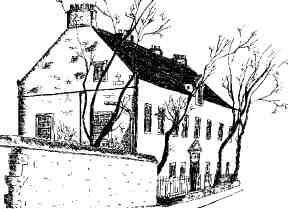Tradition tells us that
about the end of the 11th century, there was a man called
Althamer,a seafaring man, who with his crew had the doubtful
reputation of being pirates.
The story goes that their ship driven by hurricane winds was
blown into the Firth of Forth, and wrecked on rocks, at what
we now call Prestonpans. |

|
Unable to return to their old "trade", these
ship-wrecked mariners, possibly of Dutch origin, decided to
remain there, where they formed a hamlet naming it "Althamer"
in honour of their captain.Thus when the Monks of Newbattle
obtained a settlement in the district, they found the hamlet
of Althamer occupied by villagers probably descendants of
those original shipwrecked sailors. These villagers would
mostly be engaged in the fishing trade.certain of their sons
would seek employment in the newly established salt works
(1189).
The original "gift" from "De Quincy of Tranent and Winton"
was the land which ultimately became known as the "Barony
of Prestongrange".A second gift of land in the meadows of
Tranent, became known as Bankton.ln these meadows the Monks
grazed their sheep, they excavating peats as a fuel to produce
salt. It was there that they came across what they called
"Black Diamonds", in reality coal out crops between Bankton
and Seton. And so it was that during the early years of the
1.3th century (1202-10), coal was discovered and excavated
by these early settlers in the district. With an abundant
supply of coal and an even greater supply of salt water, the
salt industry flourished.
Around this time the name of the hamlet began to change.lt
had become Aldhamer, and after the arrival of the Monks, it
became known as Prieststoun.Then as if in keeping with the
new industry, it became "Salt Prieststoun", which was soon
reduced to "Salt Preston".In the course of time, the word
salt was dropped and replaced with the word "Pans", as in
salt pans, and it soon became the town and by act of Parliament
11 July 1606, and Parish of Prestonpans. |





